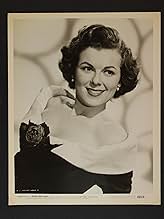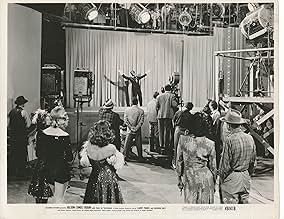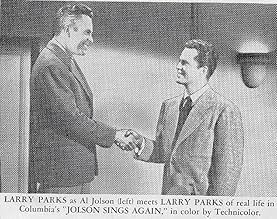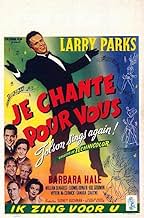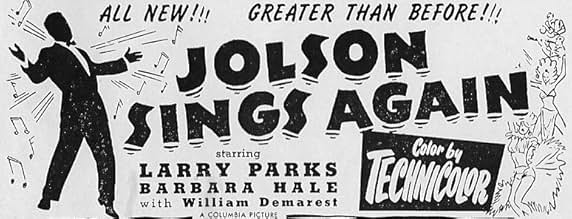Ajouter une intrigue dans votre langueIn this sequel to "The Jolson Story", we pick up the singer's career just as he has returned to the stage after a premature retirement. However, his wife has left him and the appeal of the s... Tout lireIn this sequel to "The Jolson Story", we pick up the singer's career just as he has returned to the stage after a premature retirement. However, his wife has left him and the appeal of the spotlight is not what it used to be. This time Jolson trades in the stage for life in the f... Tout lireIn this sequel to "The Jolson Story", we pick up the singer's career just as he has returned to the stage after a premature retirement. However, his wife has left him and the appeal of the spotlight is not what it used to be. This time Jolson trades in the stage for life in the fast lane: women, horses, travel. It takes the death of Mama Yoelson (Tamara Shayne) and Wo... Tout lire
- Nommé pour 3 oscars
- 4 nominations au total
- Cantor Yoelson
- (singing voice)
- Headwaiter
- (uncredited)
- Writer
- (uncredited)
- Soldier
- (uncredited)
- Bing Crosby
- (voice)
- (uncredited)
- Self - Accordionist
- (uncredited)
- Sound Mixer
- (uncredited)
- Mr. Estrada
- (uncredited)
Histoire
Le saviez-vous
- AnecdotesSince appearing as himself in The Jolson Story (1946), Al Jolson had wanted to play himself in this film too. However, he does in fact appear in the film. During the shooting of "The Jolson Story" there is a man standing watching the filming in a gray cowboy hat--this is Jolson.
- Citations
Ellen Clark: [leaving room] My! We'll soon be smart as pigs!
- ConnexionsFeatured in The Lady with the Torch (1999)
- Bandes originalesCarolina in the Morning
(uncredited)
Music by Walter Donaldson
Lyrics by Gus Kahn
Performed by Larry Parks (dubbed by Al Jolson)
In the opening of this sequel, Jolson (Parks) returns home to find Julie has packed up her bags and is gone for good. He searches for her, only to find that she has divorced him. With the advent of World War II, Jolson returns to show business by entertaining the troops overseas. During this time he finds sadness with the death of first his mother (Tamara Shayne), and later his father (Ludwig Donath). Jolson continues to be a trooper and perform whenever and wherever he's needed, but due to overwork and little rest, he collapses during a performance. He is later nursed back to health by Ellen Clark (played by Barbara Hale, based on Jolson's fourth wife, Erle Galbraith, an X-ray technician), whom he soon marries. In spite of his great showmanship, Jolson faces a setback in his career, receiving no offers and finding himself passed over by a newer generation of singers, like Bing Crosby or Frank Sinatra. When Jolson gets a chance to appear in an all-star benefit, his name is not among the many stars listed in the program, thus coming in last to sing one song to a half empty theater. Jolson's song captures the attention of Colonel Ralph Bryant (Myron McCormick), an avid fan who had previously met Jolson during his war tour. Now a movie producer, he stumbles upon an idea in producing a motion picture based on the life of the great Jolson, a big gamble that would soon pay off.
A half hour shorter than its predecessor, JOLSON SINGS AGAIN, at 96 minutes, fails to disappoint when it comes to bringing back many of the old Jolson songs, as before, sung by the real Jolson but lip-sync by Larry Parks. The soundtrack is as follows: "Rockabye Your Baby With a Dixie Melody," "Is It True What They Say About Dixie?" "For Me and My Gal," "Kol Nidre" (traditional Jewish prayer); "Back in Your Own Back Yard," "I'm Looking Over a Four-Leaf Clover," "When the Red-Red Robin Comes Bob-Bob Bobbin' Along," "Give My Regards to Broadway," "Chinatown My Chinatown," "I'm Just Wild About Harry," "Baby Face," "After You've Gone," "I Only Have Eyes For You," "Sonny Boy," "Toot-Toot Tootsie, Goodbye," "California, Here I Come," "California, Here I Come" (reprise); "You Made Me Love You," "Let Me Sing and I'm Happy," "My Blushin' Rosie," "Mammy," "The Spaniard Who Blighted My Life," "California, Here I Come" (reprise); "About a Quarter to Nine," "The Anniversary Song," "Waiting for the Robert E. Lee," "April Showers," "Pretty Baby," "Carolina in the Morning," and "Rockabye Your Baby With a Dixie Nelody" (reprise, finale). As many songs heard in this and the previous Jolson story, it is evident there are more songs to go around that never made it to the final print.
Other than William Demarest and Bill Goodwin reprising their roles as Steve Martin and Tom Baron, the supporting players include: Robert Emmett Keane, Eric Wilton, Martin Garralaga and Larry Parks. Yes, Larry Parks! Parks is the star in this production playing Al Jolson, but he also appears as himself during the Hollywood sequence where Jolson meets Larry Parks prior to the production of THE JOLSON STORY. Barbara Hale as Jolson's new and younger wife, is extremely likable. Unlike the Julie character, Hale's Ellen doesn't have a hold on her husband and agrees to let him do what he is put on Earth to do, and is to live up to his reputation as "the world's greatest entertainer."
While some may argue that JOLSON SINGS AGAIN to be an unnecessary sequel, but in fact, is a worthy follow-up. Since the earlier film found Jolson's wife leaving him during a performance, the question remains as to what becomes of Jolson afterwards. JOLSON SINGS AGAIN explains it, tracing his up and down career during the war years of the 1940s, and centers on a harsh reality as to how even the most popular of entertainers can no longer be wanted and soon forgotten by the industry. Jolson happened to be one of the fortunate ones to have achieved his greatest comeback. While many bio-pics of the day focus on the subject matter already deceased, the Jolson movies are rare cases where the central character is very much living. The real Jolson died in 1950, so chances for a third Jolson story was unlikely. As for Larry Parks, the other films in which he starred had failed to become as memorable as his two Jolsons. His career suffered a setback during the early 1950s during the McCarthy-ism era.
THE JOLSON STORY and JOLSON SINGS AGAIN make worthy double bills whenever shown on Turner Classic Movies (TCM premiere: December 13, 2007). While both films have turned up on both home video and DVD, it's JOLSON SINGS AGAIN that has lacked frequent television exposure in recent years. As sequels go, JOLSON SINGS AGAIN is as good as it gets. And with Technicolor, it's an added plus. (***1/2)
- lugonian
- 25 juill. 2003
- Lien permanent
Meilleurs choix
Détails
- Durée1 heure 36 minutes
- Rapport de forme
- 1.37 : 1
Contribuer à cette page



